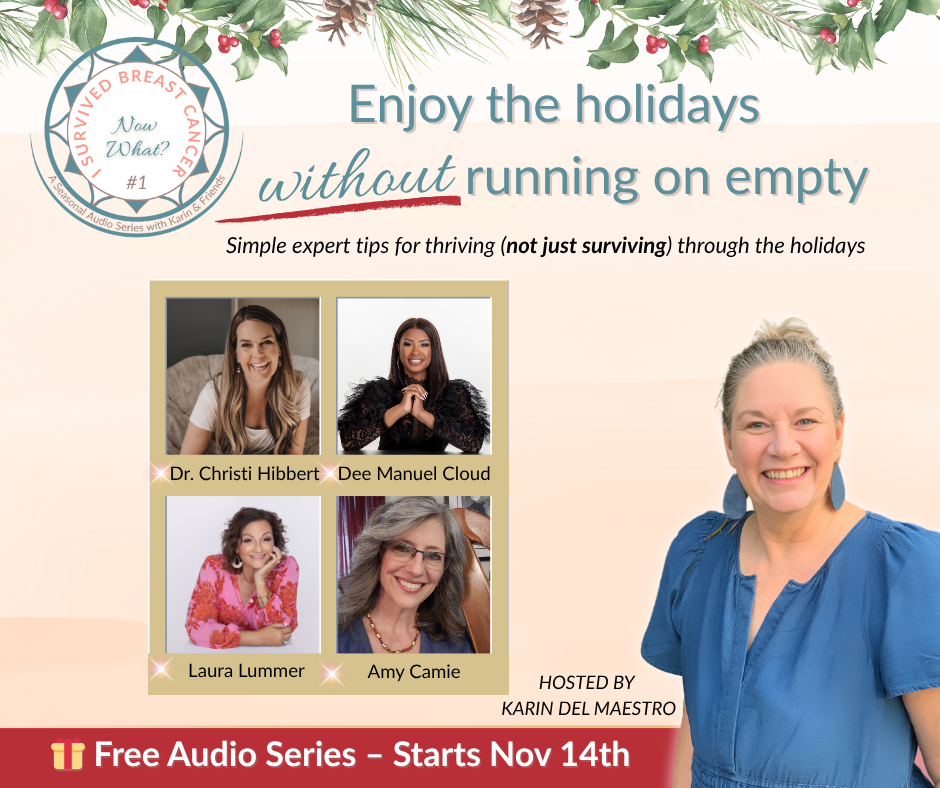What You Need to Know About Breast Cancer Recurrence
Aug 05, 2021
The topic of breast cancer recurrence is a heavy one...but, it's also a subject that I'm frequently asked about and so wanted to address it for you. And, it would be fair to say...the biggest fear of most breast cancer survivors!
My intention with this post is not to scare anyone, in fact, I'm hoping that you'll feel empowered and comforted after reading this, to know that you can take action and do what you can to protect yourself from recurrence...instead of just sitting and waiting for the other shoe to drop.
There is a great deal of medical information available online but I ask that this post and the information you may have found online, do NOT replace the information given to you by your medical team. Each of our breast cancer cases are different, and so there is no ONE SIZE FITS ALL...with our type of cancer, treatment plan, recovery or recurrence!
Ready? Grab a nice cup of tea ( I like the Buddha Teas Root Chakra tea * for this post) get comfy and let's dive in...
What exactly is recurrence?
The definition: Cancer that has recurred, usually after a period of time during which the cancer could not be detected. There are 2 types of recurrence... cancer may be in the same place as the original tumor or in another place in the body.
TYPE 1. Local Recurrence
Local recurrence happens when breast cancer is found in the remaining breast tissue, commonly reappearing at or near the original area of the breast where it was before.
If you've had a lumpectomy, you have a lot of breast tissue left. If you had a mastectomy, you still has about 2% of breast tissue left. We often don't realize that it’s impossible to remove every single breast cell.
Most local recurrence occurs within the first 5 years of diagnosis.*
Lumpectomy plus radiation therapy and local recurrence
For women who have lumpectomy plus radiation therapy, the chance of local recurrence in 10 years is about 3-15 percent.
The risk of local recurrence depends on tumor characteristics, including biomarkers (such as hormone receptor status and HER2 status).
It also depends on whether or not the tumor margins and the lymph nodes in the underarm area (axillary lymph nodes) contain cancer cells. The chance of local recurrence is lower when:
- Tumor margins do not contain cancer
- Lymph nodes do not contain cancer
Chemotherapy, hormone therapy and/or HER2-targeted therapy can lower the risk of breast cancer recurrence for people treated with lumpectomy plus radiation therapy.
Mastectomy and local recurrence
With mastectomy, the best predictor of local recurrence is whether the lymph nodes in the underarm area (axillary lymph nodes) contain cancer.
The risk of recurrence is usually higher when there are more axillary lymph nodes with cancer than when there are few or no nodes with cancer.
- When the axillary nodes don’t contain cancer, the chance of local recurrence in 5 years is about 6 percent.
- When the axillary nodes contain cancer, the chance of local recurrence in 5 years is about 23 percent following mastectomy without radiation therapy. Radiation therapy can reduce this risk to about 6 percent.
TYPE 2. Distant Recurrence
Distant recurrence is metastatic disease.
The cancer has shown up in another organ site, most commonly bone, lung, liver, or brain.
Distant recurrence is more worrisome to most of us than local recurrence.
However, having a local recurrence does not increase the risk of a distant recurrence happening.
It’s often a myth that we think, “Well, if the cancer comes back here in a residual breast cell, that means it’s already gone someplace else.”
In reality, that’s not what this means at all.
The risks of distant recurrence happening are dependent on a few things:
- The stage of the breast cancer
- The size of the invasive tumor
- The number of lymph nodes that contain the cancer
- Your prognostic factors, most specifically estrogen (ER), progesterone (PR), HER-2, and grade of the cells
- The risk of distant recurrence is the same for people who have lumpectomy plus radiation therapy and those who have mastectomy
Signs and symptoms*
Metastasis (distant recurrence) is most often found when people report symptoms that may include:
- Fatigue
- Shortness of breath
- Weight loss
- Bone pain
- Seizures
- Yellowing of the skin or whites of the eyes (jaundice)
Don’t panic if you have signs or symptoms like fatigue, weight change or bone pain. These are common problems for many of us and can often even be side-effects from treatment, but making sure to communicate this with your health care provider is crucial. (If you find that they're not listening, it may be time for a second opinion...listen to your gut and always follow up, if you're not sure!)
Most often, these signs don’t mean the breast cancer has spread. For example, bone pain may be a sign of arthritis, muscle strain or side effect from hormonal therapies. And, most of us experience fatigue after treatment, for a number of reasons.
Risk of Metastatic Recurrence
The risk of metastatic recurrence happening is dependent on many factors. Your team of doctors can explain your specific risk based on stage, tumor size, number of lymph nodes that contain cancer, and prognostic factors.
Below are a few scenarios to better understand how recurrence risk changes based on different factors:
• If someone has early stage breast cancer, a small tumor (less than two centimeters) and no lymph nodes involved, that’s good news. Her risk of recurrence is going to be quite low, usually around 10% or less.
• If someone has late stage inflammatory breast cancer, that person unfortunately is going to carry about a 60% to 70% risk of the cancer showing up in one of her distant organs because it's such an aggressive and fast-growing form of breast cancer.
There’s a big difference between those two scenarios, a 10% and 70% chance of recurrence. Every scenario is different, which is why it’s important for us to understand our risk factors and stay educated.
Prognostic factors are characteristics that can be used to estimate the chance of the cancer recurring. Prognostic factors play an important role in treatment and also help determine risk factors.
- Being estrogen receptor positive (ER+) is good news.
- Being HER-2 negative is good news.
- The patients who have a higher risk have the opposite factors. It’s estrogen receptor negative (ER-) and it’s HER-2 positive.
- Triple negative patients (ER-, PR-, HER-2 negative) also have a higher risk. These patients aren’t able to receive adjuvant hormonal therapy, which can help prevent distant recurrence from happening. They will however receive chemotherapy for prevention.
» Triple negative disease, if it were to return in the form of distant recurrence (metastatic disease), usually does so within two years of completion of the acute treatment (surgery, chemo, and radiation).
- Patients who are estrogen receptor positive (ER+) and HER-2 negative could see distant recurrence occur beyond five years, if it were to return. The larger the tumor and the number of lymph nodes that contained cancer are factors that influence how much risk there is.
There are women 10 years post-treatment, 15 years, even 20 years out of the blue, diagnosed with metastatic disease. It’s heartbreaking and scares other survivors. Though unusual to see someone who is that far out from completion of treatment present with metastatic disease, it does happen.
I know it's easy to get wrapped up in the busyness of life again after we're done with treatment, but our follow up is crucial in minimizing our risk for recurrence, as well as compliance taking any hormonal therapies, even when the side-effects really suck!
Hormonal therapy may be the most important treatment patients have. It can reduce a patient’s risk of recurrence by as much as 50%.*
Coping with the fear of recurrence
It's not uncommon to think that we have no control over getting this disease again...but in order to cope with our often, ever present fear of recurrence, it's important to know that there are many factors that we can control, that could have a massive impact on our risk factors for recurrence...this is where I step in to help guide you...because, this, my friend...is my speciality! I've even created a FREE guide for you to download, so that you can refer to it often...grab yours here.
I know that you're anxious to know what you can actually do, so let's take a look at some of the shifts you can begin to make:
- What you eat - Shifting to an anti-inflammatory diet works wonders, not just for minimizing your risk, but also helps regulate those pesky medication side-effects!
- Sleep - Shooting for 7-9 hours a night of deep restful sleep.
- Hydrating - Yes, even when you need to pee every few hours!!
- Alcohol - Studies are now reporting that NO alcohol is preferred when optimizing your risk factors.
- Managing your stress - Chronic stress can knock out our immune system, allowing our cancel cells to grow without a fight. (You may have even experienced massive amounts of stress 12-24 months prior to your diagnosis, I did!)
- Removing toxic chemicals from your home - Our homes are full of carcinogenic, hormone disrupting chemicals everywhere we turn...but it doesn't need to be hard or expensive to start making the shifts, when you have a plan.
- Self-Care FIRST! - Self-care is a conscious act one takes in order to promote our own physical, mental, and emotional health.
It's time to stop putting yourself and your needs on the back burner because, what I know to be true ...
CONSISTENT SELF-CARE IS THE ONE THING THAT SILENCES OUR NAGGING FEAR OF RECURRENCE!
I invite you to grab your FREE GUIDE BELOW and keep on reading about how you can help to protect yourself from recurrence (don't forget to sip on that delicious cup of calming tea!) xoxo Karin
*Statistics & references sourced from Susan G Komen:
https://www.komen.org/breast-cancer/survivorship/medical-care/survival-and-risk-of-recurrence/
https://www.komen.org/breast-cancer/treatment/recurrence/
*Some information based on an article by Lillie Shockney.







